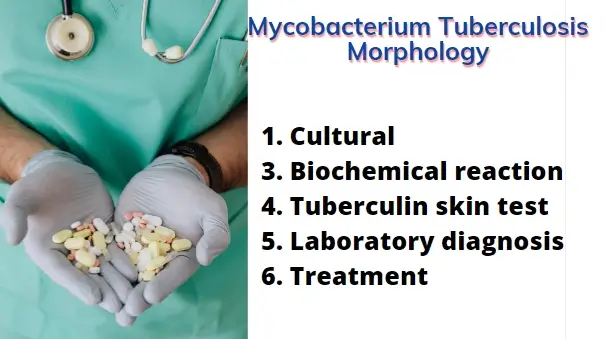Mycobacterium Tuberculosis Morphology
- Mycobacterium tuberculosis is a slender, straight or slightly curved shape bacillus associated with rounded ends.
- M. Tuberculosis is an aerobic, noncapsulated, non motile and non sporing bacteria.
- Measurement – 1 – 4 um * 0.2 – 0.8 um in size.
- It is found in pair or small clumps.
- Ziehl neelsen staining technique is required to study the M. Tuberculosis morphology.
- It is a gram positive Bacteria.
Cultural characteristics of Mycobacterium Tuberculosis
- M. Tuberculosis is an aerobie in nature that grows slowly within 14 – 15 hours.
- The organism grows at 37° C temperature with PH between 6.4 to 7.
- The colonies appear within 2 weeks (sometimes within 6 – 8 weeks).
- LJ medium (Low enstein Jensen) is commonly useful, that consist of asparagine, mineral salt eggs and glycerol.
- Bacilli are grown as a surface pellicle in the liquid media.
Biochemical reaction mycobacterium tuberculosis
- Nitrate reduction test and niacin test are the biochemical tests that are positive in the mycobacterium tuberculosis.
mycobacterium tuberculosis Resistance
- M. Tuberculosis survives in sputum for 20 – 30 hrs and in dust for several months.
- It is destroyed at 60° C temperature for 20 minutes.
Pathogenesis
- Tuberculosis disease involved pulmonary and extrapulmonary lungs.
- M. Tuberculosis occurs due to inhalation of infected droplets, coughs or sneezes.
- Bovine tuberculosis is developed due to infected cow milk.
Tuberculin skin test
- It is a delayed and types 4th hypersensitivity reaction.
- Resources – old tuberculin and purified protein derivative (PPD).
- Old tuberculin described by Robert Koch is a crude product.
- Methods – 0.1 ml of PPD is injected internally at the flexor aspect of the forearm.
- Mark the inject site.
- Result – Result are examined after 48 – 72 hours of PPD injected.
- If Erythema diameter is 10 mm or more that indicates the positive tuberculin test.
Laboratory diagnosis of mycobacterium tuberculosis
-
-
Specimen collection
-
- Collect sputum for pulmonary tuberculosis.
- Collect CSF for meningitis tuberculosis.
- Collect morning urine for renal tuberculosis.
- Biopsy of tissue is required for tissue tuberculosis.
- For joint and bone tuberculosis, aspirate the fluid.
-
-
Direct Microscopy
-
- The specimen is stained by ziehl neelsen technique.
- The acid fast Bacilli is appeased as a bright red Bacilli against a blue background.
- Purulent part of the sputum is useful to prepare a smear.
- The prepared smear is to be examined under fluorescent Microscopy.
- Microscopy provides the only presumptive evidence of TB infection.
-
-
mycobacterium tuberculosis Culture
-
- It is a very sensitive method to determine the tubercle Bacilli.
- Generally, the tubercle Bacilli grows in 2 to 8 weeks.
- In the positive culture – calories appear on the culture medium, smear is made from the isolated colonies or stained with ziehl – neelsen technique.
-
-
mycobacterium tuberculosis Serology
-
- The method used to detect the mycobacterium antibiotics in the patient serum.
- Serology include following test
- ELISA
- RIA
- Latex agglutination assay.
-
-
Molecular methods
-
- PCR (polymerase chain reaction) is a rapid diagnostic method of Tuberculosis.
- PCR test is based on the DNA amplification that detects the M. Tuberculosis directly in the clinical specimen.
Treatment of mycobacterium tuberculosis:-
- Common antitubercular drugs are – isoniazid, rifampicin, streptomycin, pyrazinamide, ethambutol etc.
- BCG vaccine – proposed by the calmette and guerin in 1921.
- BCG is – Bacilli calmette guerin.
- BCG dose – 0.1 ml at 1 month of birth and 0.05 ml at the birth.
- The BCG vaccine is around 80% effective to protect against tuberculosis.
Read Other Articles Related to Tuberculosis……..
????what is tuberculosis? Symptom Cause and Treatment
???? MOST Common Cause, Type, Symptom Of Any Disease
Reference – Textbook of microbiology 5th edition by Dr. C.P. Baveja.
Page no. – 330 – 340.














